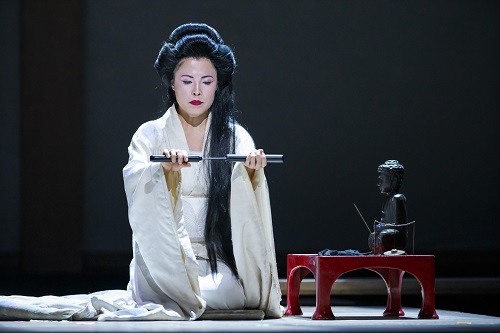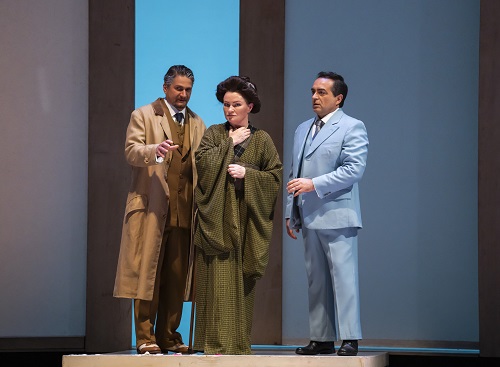Puccini’s Madama Butterfly, beautiful though it is, presents issues for contemporary values; hence the current rethink of the Moshe Leiser and Patrice Caurier production. The Royal Opera brought in Japanese practitioners and academics to work towards a Butterfly that is “both true to the spirit of the original and more authentic in its representation of Japan”. Daniel Dooner, the revival director, has made changes that are often subtle yet telling: the actual gestures characters make now feel more authentically Japanese; the artifice of make-up on faces is toned down. Revival movement director Sonoko Kamimura and costume, wigs and make-up consultant Etsuka Handa make the sum total of these tweaks a massive change in the right direction. Characters move away from caricature; and as an audience we (in theory) are able to engage better with the drama, with a proper sense of place. Even the way the Japanese characters walk has a sense of authenticity about it – more of a glide.
The staging itself, with sets by Christian Fenouillat, remains beautiful: the sliding panels revealing a famous black-and-white photograph of the harbour of Nagasaki, the superb lighting, silhouettes (tastefully done, and most powerfully done in the case of Kate Pinkerton as external, threatening presence in the final act). The simple stage is a powerful setting for the emotions on show. Christophe Fore’s lighting is simply beyond criticism. The scene is literally set for a great performance of Butterfly. What could possibly go wrong?

Lots and lots, as it turns out. There were two principal uncomfortable counterpoints to all of this that threw the whole enterprise way off-kilter. The first was the conductor, Dan Ettinger, often creepingly slow then suddenly stomping on the accelerator pedal. Despite a purposeful, if somewhat dry, opening, this was one of the most soporific Butterfly performances that this reviewer has come across; frequently, the music lost any sense of animation or, vitally, direction. The pre-interval segment seemed of Wagnerian length; interestingly, when the lights came up, it was ‘to time’ – an indication, perhaps of its longueurs. Orchestral colour was another casualty, as the whole score merged into a grey mush. It is true Ettinger is sensitive to his singers (he was a singer himself before taking up the baton), but the loss of directionality was unforgivable. And this came as not only the result of his tempi; he seemed largely unaware of the larger structural issues.
The cast itself has been the victim of significant changes: Dinara Alieva cancelled as Cio-Cio-San while Oleysa Petrova cancelled as Suzuki, both due to ‘delayed visa processing times’. Eri Nakamura, a former Jette Parker artist 2008-10, was the superb Butterfly here while Suzuki was sung by Patricia Bardon. Nakamura was the star of the performance: it feels something of a privilege to experience a Japanese Butterfly anyway, but her voice is perfect for the role, her acting wonderful. We feel her pain, despite everything, at the end. I say ‘despite everything’ because of the casting of Gianluca Terranova as Pinkerton. Although he seems to revel in the big roles (a slew of Alfredo Germonts preceded this Pinkerton), his voice seemed small, often too quiet, and ultimately anonymous. The big arias counted for little; good that Ettinger largely kept the orchestra from swamping him, but there was no heart-on-sleeve tingle factor. Put simply, one found it difficult to engage with any aspect of this character. When it comes to audience reactions, booing is controversial perhaps, but it was certainly on display at the end of the opera, and roundly so.

Mezzo Patricia Bardon as Suzuki felt a touch awkward dramatically: perhaps this is not her most natural role, but her voice remains beautiful, and a fabulous foil for Nakamura’s Butterfly. It was interesting to see a de-caricatured Goro: Alexander Karavets revelled in the opportunities to show a more rounded character. Gyula Nagy’s Sharpless was another fine assumption, while Jeremy White was a convincing Bonze. Unfortunately, Alan Pingarron emerged as a somewhat bleaty Yamadori. All credit to Cio-Cio’s child, on this occasion Toby Carlton Jones, for his poignant contribution at the end.
Ultimately, though, this was the most musically unsatisfying Butterfly I have ever heard. The evening performance was to bring Freddie di Tommaso as Pinkerton and Liana Haroutounian as Butterfly; it would be interesting to hear the differences, but with Ettinger a constant in the pit, the pull diminishes somewhat. A pity this well-intentioned revival, with its experiments in natural realism (remember Puccini himself is not exactly ‘realistic’ in approach) is scuppered at every turn.
Colin Clarke
Cio-Cio-San (Madama Butterfly) – Eri Nakamura, Pinkerton – Gianluca Terranova, Suzuki – Patrricia Bardon, Goro – Alexander Karavets, Sharpless – Gyula Nagy, Yakusidé– Andrew O’Connor, Yamadori – Alan Pingarron; Kate Pinkerton – Rachel Lloyd; Imperial Commissioner – David Kimberg, Dolore (Cio-Cio-San’s child) – Toby Carlton Jones; Directors – Moshe Leiser and Patrice Caurier, Revival Director – Daniel Dooner, Conductor – Dan Ettinger, Chorus of the Royal Opera House, Covent Garden (chorus director: William Spaulding), Orchestra of the Royal Opera House, Covent Garden.
Royal Opera House, Covent Garden, London; Saturday 18th June 2022 (matinée).
ABOVE: Eri Nakamura (Cio-Cio San); Patricia Bardon (Suzuki) © 2022 ROH / Tristram Kenton